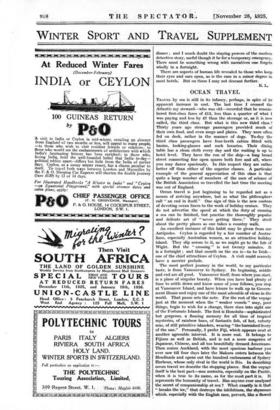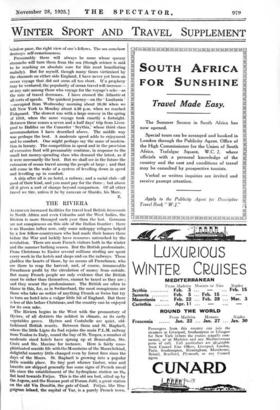OCEAN TRAVEL TRAVEL by sea is still in its infancy,
perhaps, in spite of its apparent increase in cost. The last time I crossed the Atlantic my steward—who was old—recorded that he remem- bered first-class fares of £12, less than a quarter of what I was paying and less by £7 than the steerage or, as it is now called, the third class. But what is this new third class ? Thirty years ago steerage passengers provided much of their own food, and even mugs and plates. They were often fed on deck, rather in the manner of dogs. To-day the third class passengers have four-berth cabins fitted with basins, looking-glasses and such luxuries. Their dining table has a clean cloth every day and the waiting is up to hotel level. They have the run of the ship—a long broad street connecting fine open spaces both fore and aft, where you may dance spaciously. In this respect they are rather better off than either of the superior classes. A particular example of the general appreciation of this class is that quite a large number of members of the men of science of the British Association so travelled the last time the meeting was out of England.
Ocean travel is just beginning to be regarded not as a means of arriving anywhere, but as what the philosophers call " an end in itself." One sign of this is the new custom of devoting ocean liners to the work of holiday cruises. They do not advertise the speed at which the duty of crossing a sea can be finished, but practise the thoroughly popular and delicate art of " never getting there." They stroll about the pretty places as one takes a country walk.
An excellent instance of this habit may be given from our Antipodes. Ceylon is regarded by a fair number of Austra- lians, especially Australian women, as an attractive holiday island. They slip across to it, as we might go to the Isle of Wight. But the " crossing " is not twenty minutes. It is a fortnight ; and that month on the sea is—to be Irish— one of the chief attractions of Ceylon. A visit could scarcely have a merrier prelude.
The most perfect journey in the world, to my particular taste, is from Vancouver to Sydney. Its beginning, middle and end are all good. Vancouver itself, from where you start, is a place of singular beauty. When you have had plenty of time to settle down and know some of your fellows, you stop at 'Vancouver Island, and have leisure to walk up to Govern- ment House and enjoy one of the most adorable of views in the world. That pause sets the note. For the rest of the voyage just at the moment when the " weaker vessels " may, poor things, begin to wish for a change, there rises into sight one of the Fortunate Islands. The first is Honolulu—sophisticated but gorgeous, a flaming memory for all time of tropical mysteries, of rainbow hues, of fantastic fish, of hot, velvety seas, of still primitive islanders, wearing "the burnished livery of the sun." Personally, I prefer Fiji, which appears next at another agreeable interval. It is more real. It belongs to Fijians as well as British, and is not a mere congeries of Japanese, Chinese, and all too beautifully dressed Americans. Then comes Auckland, with the most spacious harbour you ever saw till four days later the Makura enters between the Headlands and opens out the hundred embrasures of Sydney Harbour, whose only rival in the world is Rio. In describing ocean travel we describe the stopping places. But the voyage itself is the best part—mea sententia, especially on the Pacific, when it is true to its name, as for the most part it is. It represents the humanity of travel Has anyone ever analysed the secret of companionship at sea ? What exactly is it that " breaks the ice," that destroys the inhibitions, the shynesses which. especially with the English race, pervert, like a Hawed 1window pane, the right view of one's fellows. The sea somehow destroys self-consciousness.
Presumably there will always be some whose queasy stomachs will turn them from the sea (though science is said to be reaching an absolute cure for this most humiliating malady). But for myself, though many times victimized by the channels on either side England, I have never yet been an ocean voyage that did not seem all too short. If a prophecy may be ventured, the popularity of ocean travel will increase— at any rate among those who voyage for the voyage's sake—as the rate of travel decreases. I have crossed the Atlantic at all sorts of speeds. The quickest journey—on the Lusitania ' —occupied from Wednesday morning about 10.30 when we left New York to Monday about 4.30 p.m. when we reached Fishguard. The slowest was with a large convoy in the spring of 1918, when the same voyage took exactly a fortnight. Between these comes a seven and a half days' trip from Liver- pool to Halifax on the Cunarder Scythia,' whose third class accommodation I have described above. The middle way was perhaps the best. A moderate speed adds to enjoyment and to comfort. One might perhaps say the same of modera- tion in luxury. The competition in speed and in the provision of excessive food will presumably continue, in response to the small but money-spending class who demand the latest, as if it were necessarily the best. But we shall see in the future the extension of ocean travel among the people at large ; and that will come in the wake of a system of levelling down in speed and levelling up in comfort.
A ship after all is an hotel, a railway, and a social club—all good of their kind, and you must pay for the three ; but above all it gives a sort of change beyond comparison. Of all other travel we tire, unless it be by 'caravan or Shanks, his Mare.
Z.























































 Previous page
Previous page